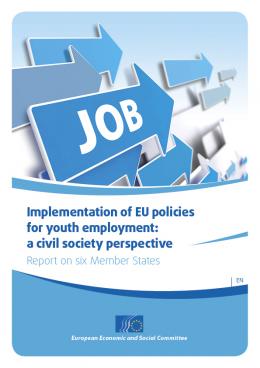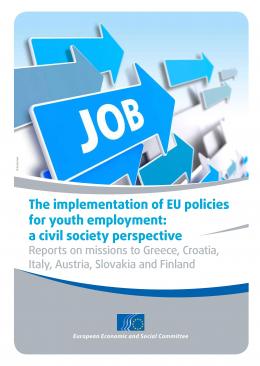European Economic
and Social Committee
Subscribe
Main navigation
-
Über uns
ABOUT
The European Economic and Social Committee (EESC) is the voice of organised civil society in Europe.
Find out more about its role and structure at http://www.eesc.europa.eu/en/about
- Politische Struktur
- Verwaltungsstruktur
- ZUSAMMENARBEIT MIT ANDEREN INSTITUTIONEN
- Geschäftsordnung
-
Unsere Arbeit
OUR WORK
The EESC issues between 160 and 190 opinions and information reports a year.
It also organises several annual initiatives and events with a focus on civil society and citizens’ participation such as the Civil Society Prize, the Civil Society Days, the Your Europe, Your Say youth plenary and the ECI Day.
Find the latest EESC opinions and publications at http://www.eesc.europa.eu/en/our-work/opinions-information-reports/opinions and http://www.eesc.europa.eu/en/our-work/publications-other-work/publications respectively.
- Stellungnahmen und Informationsberichte
- Dokumente
- Veröffentlichungen und sonstige Arbeiten
-
Beteiligung der Zivilgesellschaft und der Bürgerinnen und Bürger
- European elections 2024
- Civil Society Week 2024
- Preis der Zivilgesellschaft
- The Conference on the Future of Europe
- Tag der Zivilgesellschaft
- Europäischer Demokratiepass
- Your Europe, Your Say!
- Europäische Bürgerinitiative (EBI)
- The path to our industrial future
- Youth Climate and Sustainability Round Tables
- EU Organic Awards
- Civil Society Against COVID-19
- EESC stands with Ukraine
- Partnerships
- Relations with ESCs
-
Politikbereiche
POLICIES
The EESC is active in a wide range of areas, from social affairs to economy, energy and sustainability.
Learn more about our policy areas and policy highlights at http://www.eesc.europa.eu/en/policies
-
Politikbereiche
- Landwirtschaft, ländliche Entwicklung und Fischerei
- Maßnahmen zum Klimaschutz
- Kohäsions-, Regional- und Städtepolitik
- Verbraucher
- Digitaler Wandel und Informationsgesellschaft
- Wirtschafts- und Währungsunion
- Allgemeine und berufliche Bildung
- Beschäftigung
- Energie
- Unternehmen
- Umwelt
- Außenbeziehungen
- Finanzdienstleistungen und Kapitalmärkte
- Grundrechte und Bürgerrechte
- Industrie und industrieller Wandel
- Institutionelle Angelegenheiten und EU-Haushalt
- Migration und Asyl
- Forschung und Innovation
- Dienstleistungen von allgemeinem Interesse
- Binnenmarkt
- Sozialfragen
- Nachhaltige Entwicklung
- Besteuerung
- Verkehr
-
Politikbereiche
-
Agenda
AGENDA
The EESC holds nine plenary sessions per year. It also organises many conferences, public hearings and high-level debates related to its work.
Find out more about our upcoming events at http://www.eesc.europa.eu/en/agenda/our-events/upcoming-events
- Unsere Veranstaltungen
-
Aktuelles & Medien
NEWS & MEDIA
Here you can find news and information about the EESC'swork, including its social media accounts, the EESC Info newsletter, photo galleries and videos.
Read the latest EESC news http://www.eesc.europa.eu/en/news-media/news and press releases http://www.eesc.europa.eu/en/news-media/press-releases
- Präsident
-
Mitglieder & Gruppen
MEMBERS & GROUPS
The EESC brings together representatives from all areas of organised civil society, who give their independent advice on EU policies and legislation. The EESC's326 Members are organised into three groups: Employers, Workers and Various Interests.
Find out more about our Members and groups at http://www.eesc.europa.eu/en/members-groups
- Mitglieder
- Gruppen
-
Fachgruppen & weitere Arbeitsorgane
SECTIONS & OTHER BODIES
The EESC has six sections, specialising in concrete topics of relevance to the citizens of the European Union, ranging from social to economic affairs, energy, environment, external relations or the internal market.
Find out more at http://www.eesc.europa.eu/en/sections-other-bodies
-
Fachgruppen / Kommissionen
- Wirtschafts- und Währungsunion, wirtschaftlicher und sozialer Zusammenhalt (ECO)
- Binnenmarkt, Produktion, Verbrauch (INT)
- Verkehr, Energie, Infrastrukturen, Informationsgesellschaft (TEN)
- Beschäftigung, Sozialfragen, Unionsbürgerschaft (SOC)
- Landwirtschaft, ländliche Entwicklung, Umwelt (NAT)
- Außenbeziehungen (REX)
- Beratende Kommission für den industriellen Wandel (CCMI)
- Beobachtungsstellen
- Weitere Arbeitsorgane
-
Fachgruppen / Kommissionen
- Ukraine
EESC Network menu
sidebar submenu
- Stellungnahmen und Informationsberichte
- Dokumente
- Veröffentlichungen und sonstige Arbeiten
-
Beteiligung der Zivilgesellschaft und der Bürgerinnen und Bürger
- European elections 2024
- Civil Society Week 2024
- Preis der Zivilgesellschaft
- The Conference on the Future of Europe
- Tag der Zivilgesellschaft
- Europäischer Demokratiepass
- Your Europe, Your Say!
- Europäische Bürgerinitiative (EBI)
- The path to our industrial future
- Youth Climate and Sustainability Round Tables
- EU Organic Awards
- Civil Society Against COVID-19
- EESC stands with Ukraine
- Partnerships
- Relations with ESCs









